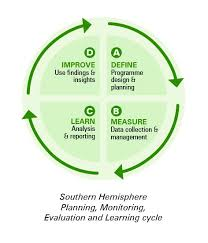
Course Overview
The concept of globalization has introduced growing pressures on governments and organizations around the world to be more responsive to the demands of the stakeholders, which include government departments, parliaments, citizens, communities, the private sector, Non-Governmental Organizations (NGOs), civil society, international organizations, environments and donors. They are demanding good governance, accountability and transparency, greater development, effectiveness, and delivery of tangible results (Kusek and Rist 2004. This course has therefore been designed to bring the relevant M&E skills to equip participants in fostering accountability and transparency in project delivery.
This online course has been designed exactly like the in-class version. All training materials are already loaded in the learning management system. You will also write some tests which have as well been loaded. The test is to enable you assess yourself if learning has actually taken place and your score will be shown by the learning management system. Should you have any need to ask questions or request explanations on technical issues, please arrange a video conference with your instructors by sending an e-mail to fix a suitable date and time to [email protected]
Learning Objective
At the end of this training session, participants will be able to
- Apply international best practices when planning development projects
- Deploy monitoring as a key to the successful implementation and management of development projects
- Create your own Monitoring Plan
- Differentiate between participatory and conventional approaches to monitoring and evaluation and how to combine the best of both methodologies
- Draw up clear, well-focused Terms of Reference for Evaluations
- Carry out a project or program evaluation effectively
- Write professional, useful Evaluation Reports
Course Outline:
Lesson 1: The need for monitoring and evaluation in development projects
- Introduction to monitoring and evaluation terms and concepts
- Difference between monitoring and evaluation
- The need for monitoring and evaluation in development projects
- Monitoring in all process of the project cycle
- Types of indicators and Identifying outcome indicators for your project
Lesson 2: Monitoring and Evaluation Framework
- Types of Frameworks
- Role of in Monitoring and Evaluation planning
- Introduction to Monitoring and Evaluation Plan
- Describe the functions of an M&E plan
- Describe the main elements of an M&E plan
- Define standards for an M&E plan
- Describe some of the complexities of M &E plan
- Provide an overview of M&E plan implementation modalities
Lesson 3: Data Collection, Capture, and Data Quality Checks
- Identify types of data collection tools
- Identify type of tools at each M &E level
- Define data capture
- Identify key steps in data capture
- Define data quality
- Quantitative methods
- Qualitative methods
- Data Analysis, Interpretation and Reporting
- Role of data analysis in monitoring and evaluation
- Types of data analysis
- Interpretation of data
- Deciding which reporting methods to use
- Writing an effective M/E report
- Communication of M&E findings for action and accountability

